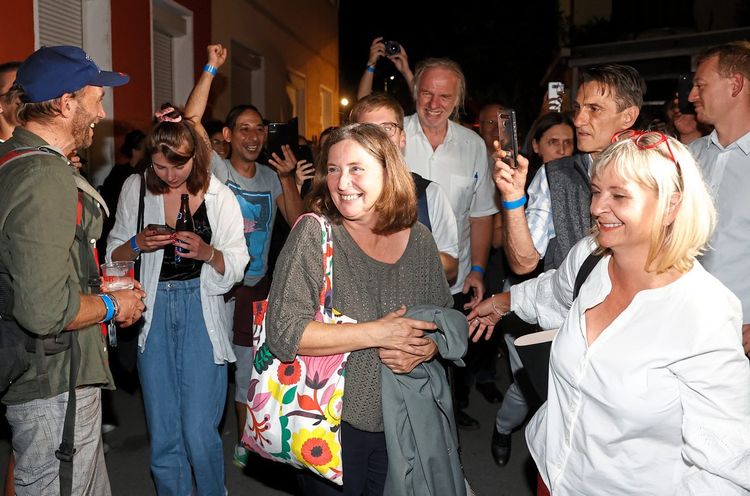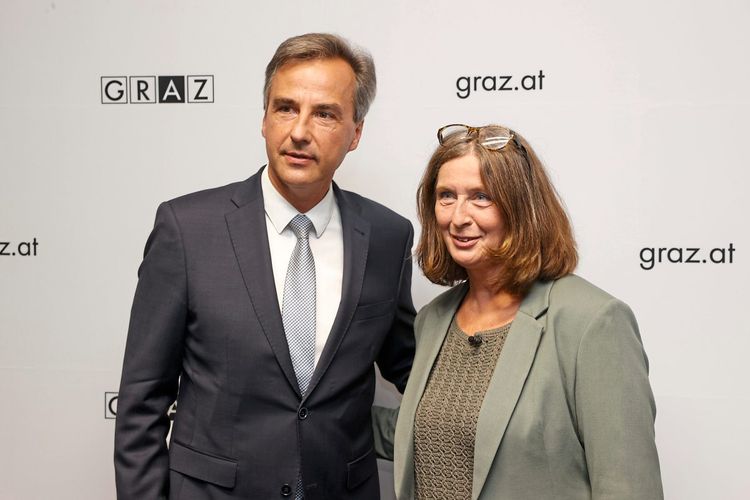
The leader of the Communist Party, Elke Kahr (middle), celebrating her victory on Sunday.
"Dieser Text erscheint auch auf Deutsch. This text is also available in German."
It was likely one of the strangest moments on this historical election evening in Graz. A clearly emotional Siegfried Nagl, until then the center-right mayor of the city, announced his resignation by saying: "I will withdraw my protective hand, but also my helping hand, from Graz." After his 18-year tenure as mayor of the southeastern Austrian city, what exactly did he mean by "protective hand." It sounded like a threat. "OK, I’m leaving you to the communists. That’s apparently what you voters wanted. You’ll see what it brings!"
The "Leningraz" Apocalypse
Shortly before the election, members of Nagl’s party, the Austrian People’s Party (ÖVP) of Austrian Chancellor Sebastian Kurz, had warned in drastic terms of what might happen if the communists were allowed to prevail in the election. A vote for the leftists, they said, was "a vote for chaos, terror and fear." They warned of mass unemployment. The term "Leningraz" even made the rounds.
And then, there was the ultimate victor of the elections, the head of the Communist Party of Graz (KPÖ) Elke Kahr, who had given the ÖVP apocalyptic nightmares, standing before the television cameras earlier in the day and answering questions about what she would do until the election results were announced. Her answer? She said she would use the time to finally do a bit of housework and wash a couple of loads of laundry. The beautiful weather, she insisted, was perfect for drying.
Kahr is well known for precisely those kinds of reactions. No grand words – a language that everyone speaks. She could be the friendly next-door neighbor who always offers help when needed. Precisely 28,8 percent of the voters in Graz, the capital of the state of Styria, were of the opinion on Sunday that Elke Kahr was not actually planning on launching the next communist revolution from the city, but would instead devote herself to helping the "common people," just as she has in previous years. That’s what the residents of Graz have grown accustomed to from her.
Communist Support from the Upper-Middle Class
Kahr, say many, harbors nostalgia for Soviet-style communism, accusations that she calls "laughable." People have known her and her party well enough for decades, she says.And she has developed a following that now stretches through all segments of the population. In the detailed results of this municipal election, it becomes clear that the KPÖ under Elke Kahr has been able to win votes even in obviously upper-middle class neighborhoods of the city. Outgoing Mayor Siegfried Nagl gambled away a fair amount of support in such neighborhoods by giving real estate investors free rein – right in the midst of long-time ÖVP supporters.

Why, though, was the KPÖ able to find success in Graz when it hasn’t even managed to get on the ballot in other Austrian states? Political scientist Manès Weisskircher told the STANDARD that it "wasn’t specific milestones, but the long-term focus on the issue of housing that was decisive." It began with Elke Kahr’s predecessor, Ernest Kaltenegger, who focused his attentions on this essential area of city management after all the other parties ignored it. He would visit residents of substandard apartments on a regular basis, listen to their concerns and arrange for assistance. He established an emergency hotline for renters.
A Self-Imposed Salary Cut
And then there is the political credibility that informs the KPÖ’s election success, said Weisskircher. Whereas politicians at the federal level continually exceeded their campaign budgets, the communists in Graz didn’t just call for cuts in the public funding provided to political parties. They also set aside two-thirds of the 5,500-euro salaries they earned. With a salary like that, Kahr once said, it is easy to lose sight of the concerns facing the population at large. The money was placed in a fund that has since then been used to help people who have been laid off or evicted. The KPÖ says that 1.7 million euros have poured into the fund since 1998.
Support for the KPÖ, derogatorily referred to as a charity by other parties, continuously grew. As the municipal official in charge of apartments, Kaltenegger pushed through a policy ensuring that every apartment be equipped with a shower and a toilet. Colleagues of his in government were astounded that such substandard apartments even still existed in the city. Kahr continued Kaltenegger’s approach after he withdrew from politics. The result of the years 2004 to 2016: 960 new community housing units built and property for 550 apartments acquired. The social image of the party continued to grow.
A Misguided Plan
Officials in the Graz chapter of the ÖVP, under soon to be former mayor Nagl, and in the right-wing populist Freedom Party of Austria (FPÖ), with whom he has led a coalition government since 2016, were aware of Kahr's popularity. They knew that if they continued to leave housing policy up to her, it would be politically dangerous. They had to seize the core social issue from the KPÖ. As such, they essentially shunted her aside following the 2016 municipal elections and made her responsible for the transport portfolio, hoping it would take the wind out of her party's sails. Sunday's landslide victory for the KPÖ clearly demonstrates that the plan failed miserably. But what does the future hold in store for the KPÖ, which – for the first time – could soon control a city hall in Austria?
"The majority comprised of the Communists, the Green Party and Social Democrats could open up a new window of opportunity here," said Weisskircher, who added that it can be assumed that the communists will continue to focus on housing policy. In its election platform, the KPÖ also called for a minimum wage of 15 euros an hour, a reduction in working hours and the safeguarding and creation of jobs through public investment.
Weisskircher doesn't believe there will be any kind of rapid communist expansion into the other Austrian states, given the amount of long-term political legwork that would require. The political scientist does, however, believe that other left-wing groups, particularly the Social Democrats, should engage in some self-reflection in light of the KPÖ's election success in Graz. What the vote in Graz has ultimately demonstrated is that the "electoral successes of far-right parties are not a law of nature. If left-wing actors fail elsewhere, they also in part have themselves to blame." (Walter Müller, Elisa Tomaselli, 27.9.2021)